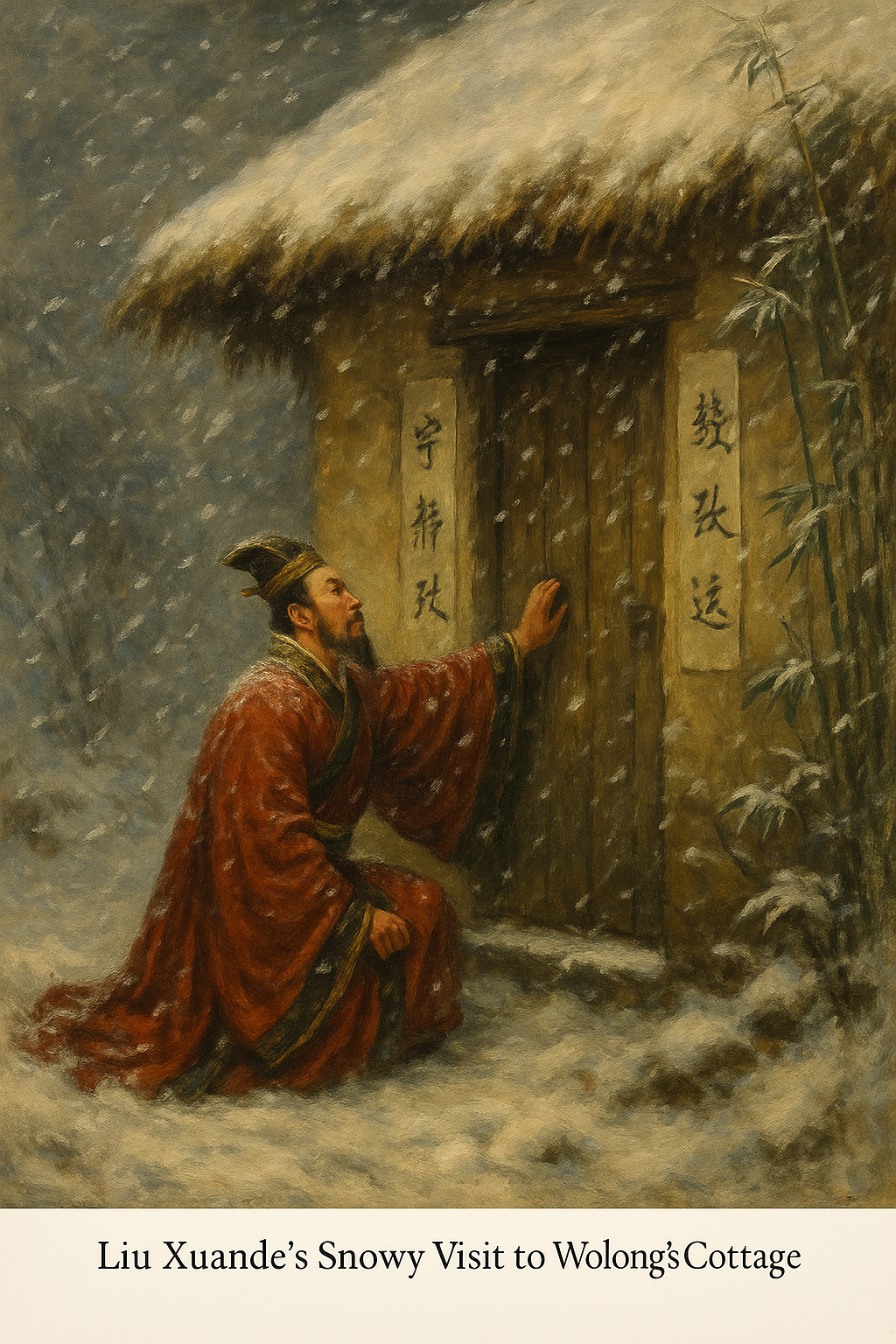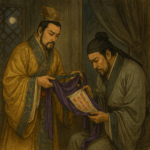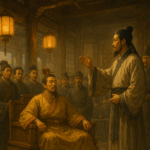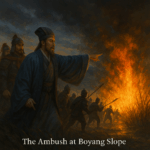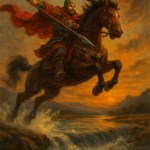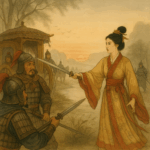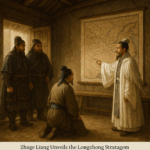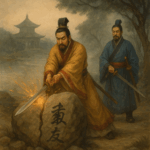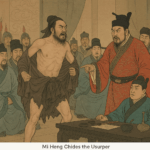Xu Shu hurried on horseback to Xuchang. When Cao Cao learned of his arrival, he summoned Xun Yu, Cheng Yu, and the other strategists to welcome him. Entering the Chancellor’s residence, Xu Shu knelt and paid his respects. Cao Cao said, “You are a man of exceptional talent—why have you humbled yourself to serve Liu Bei?” Xu Shu replied, “In my youth I escaped disaster and drifted across the land until I reached Xinye, where I formed a deep bond with Lord Xuande. My aged mother remains here; his kindness shames me.” Cao Cao said, “Now that you are here, you may serve your mother morning and evening, and I may receive your counsel.” Xu Shu thanked him and withdrew, hastening to see his mother. He fell to his knees and wept at her doorstep. His mother, startled, cried, “Why have you come here?” Xu Shu explained, “I went to serve Liu Yuzhou at Xinye; upon receiving your letter, I rode through the night to return.” Enraged, Lady Xu slammed the table. “After all these years of hardship, I thought you were making progress in your studies—how could you be worse than before? You know that loyalty and filial piety cannot both be fulfilled. Do you not see that Cao Cao is a traitor who deceives both sovereign and heaven? Liu Xuande’s righteousness is known throughout the world, and he is of imperial blood. You have served him faithfully—now you abandon light for darkness at the prompting of a forged letter, staining your name. Fool that you are! How can I face you? You have brought shame on our ancestors!” Xu Shu fell prostrate, too ashamed to look up. Stricken, Lady Xu retreated behind a folding screen. Moments later, the servants burst in: “Madam has hanged herself from the beam!” Rushing to her side, Xu Shu found her breath had already departed. In her memory, later generations composed the “Praise of Madam Xu”:
Virtuous Madam Xu, your fame endures through a thousand autumns.
Keeping your vow intact, you upheld family honor.
You taught your son at great personal cost,
Your righteous spirit stood like a mountain, your loyalty sprang from the heart.
You praised Lord Yuzhou and denounced Wei Wu unflinchingly,
Fearless of cauldrons or executioner’s sword,
Only fearing that your son might ever disgrace his forebears.
You wielded your blade alongside the river,
Your steadfastness unmatched among mortals.
Born to honor, you died in your rightful place—
Virtuous Madam Xu, your fame endures through a thousand autumns!
Overwhelmed, Xu Shu collapsed in grief. Eventually he recovered and returned to Xuchang. Cao Cao sent gifts and personally attended the burial. Xu Shu laid his mother to rest south of Xuchang and observed the mourning rites himself, refusing all honors Cao Cao bestowed.
Meanwhile, Cao Cao planned a campaign southward. Xun Yu advised, “The winter chill still holds—wait until spring before advancing.” Cao Cao heeded him, dammed the Zhang River to form a training reservoir called the Xuanwu Pool, and began drilling his naval forces for the coming expedition.
Back at Xinye, Liu Xuande was arranging gifts for his journey to Longzhong to see Zhuge Liang when a messenger announced, “A gentleman awaits at the gate, wearing a scholar’s cap and broad robe, with an imposing bearing—he has come to see you.” Xuande exclaimed, “Could it be Kongming himself?” He donned his finest robes and went out to welcome the guest. It was Sima Hui. Overjoyed, Xuande invited him into the back hall and seated him on a high chair. After greetings, he said, “Master, since we last parted, military duties have kept me from calling on you. Your appearance today delights me beyond words.” Sima Hui replied, “I heard Xu Yuanzhi (Xu Shu) was here and came to see him.” Xuande explained, “Because Cao Cao imprisoned his mother and a letter called him back to Xuchang, he set out for home.” Sima Hui said, “That too is Cao Cao’s stratagem. Madam Xu was the paragon of virtue—though held prisoner, she would never summon her son willingly. That letter must be a forgery. If Yuanzhi returns, his mother will die!” Xuande gasped, “Why?” Sima Hui answered, “Madam Xu’s conscience would shame her to face her son after such deceit.” Xuande asked, “When Xu Shu left, he spoke of recommending Zhuge Liang of Nanyang. What manner of man is he?” Sima Hui laughed, “If Xu Shu wanted to leave, let him go—why trouble yourself to retrieve him?” Xuande pressed, “Why say that?” Sima Hui replied, “Kongming counts among his close friends Cui Zhouping of Boling, Shi Guangyuan of Yingchuan, and Meng Gongwei of Runan, as well as Xu Shu. These four men are pure and devoted, but only Kongming holds a grand vision. He once sat pondering under a tree, pointing to these four and declaring, ‘You may all rise to commanderies and prefectures, but my ambition soars beyond.’ When asked his aim, Kongming smiled without answer. He likens himself to Guan Zhong and Yue Yi—his talent is immeasurable.” Xuande said, “How rich is Yingchuan in worthy men!” Sima Hui replied, “Long ago, the star-watcher Yin Kui predicted that where the stars cluster over Yingchuan, great talents would appear.” Guan Yu, standing nearby, said, “Guan Zhong and Yue Yi were heroes of Spring and Autumn, Warring States—if Kongming compares himself to them, is he not arrogant?” Sima Hui chuckled, “He need not be compared to them—I would liken him to Jiang Ziya of early Zhou and Zhang Liang of early Han.” All were astonished. Sima Hui rose to take his leave. Xuande tried to detain him, but he only laughed to heaven—“The Crouching Dragon may have found his lord, but not his season of service. What a pity!”—and drifted away. Xuande sighed, “Truly a hermit of extraordinary virtue.”
The next morning, Xuande set out with Guan Yu, Zhang Fei, and attendants for Longzhong. On the hillside they heard a peasant singing:
Heaven’s vault a perfect dome, the earth a checkerboard plain.
Men move as black and white stones, contending for honor and shame.
The honored rest in comfort, the ashamed toil in vain.
In Nanyang lie the recluses—why not slumber on?
Xuande halted his horse and asked, “Who composed this song?” The peasant replied, “The Crouching Dragon himself.” Xuande asked, “Where does he live?” The peasant said, “A high ridge to the south—Wolong Ridge. In the sparse woods by the stream is his thatched cottage, where the Master lies in repose.” Xuande thanked him and rode on. After only a few li, Longzhong Ridge came into view—its scenery truly singular. Later poets would memorialize it:
Twenty li west of Xiangyang’s walls,
A high ridge cradles winding streams.
Its curves coil like a trapped dragon,
Its shape like a lone phoenix in pine’s embrace.
A half-hidden gate guards a humble hut,
Where the great recluse abides unseen.
Bamboo and pines form a green screen,
Wildflowers scent each season’s breeze.
Scrolls fill the seat by his bedside,
No common folk come and go.
Monkeys offer fruit at his knock,
An old crane guards the door by night.
A fine qin lies hidden in his satchel,
A treasured sword hangs upon the wall.
In that solitary hut lives rare grace,
He tills his fields at leisure’s pace.
Awaiting the spring thunder’s call,
With one long cry he will calm the world.
Xuande arrived at the farmer’s gate, dismounted, and knocked. A boy appeared. “Sir,” Xuande announced, “I am Liu Xuande, Han’s left general and Prince of Yicheng. I have come to pay respects.” The boy said, “I don’t remember all the names.” Xuande said, “Just tell him Liu Bei has come.” The boy said, “He went out early this morning.” Xuande asked, “Where did he go?” The boy shrugged, “I do not know.” Xuande sighed, “When will he return?” The boy said, “Who can say? May be three or five days, may be more.” Xuande’s heart sank. Zhang Fei grumbled, “If he won’t see us, let’s go home.” Xuande replied, “Let us wait a while.” Guan Yu said, “Better to return and send word by messenger.” Xuande agreed. Giving the boy instructions—“When Master returns, say Liu Bei seeks him”—he remounted and rode off, but he glanced back at the ridge’s serene beauty.
Several days later Xuande sent scouts again. They returned: “The Crouching Dragon has returned.” Xuande at once saddled his horse. Zhang Fei scoffed, “He’s nothing but a country bumpkin—we could have our people fetch him.” Xuande rebuked, “Have you forgotten Mencius? ‘To seek the worthy without proper courtesy is like inviting a guest only to bar the door.’ How can Kongming be summoned?” With that, they rode out once more, this time braving a bitter winter storm. Snow swirled like blossoms across the ridge. Zhang Fei complained, “It’s freezing—why risk a fruitless errand? We should head back to Xinye and shelter.” Xuande said, “I wish to show Master Kongming my sincerity. If you fear the cold, you may return.” Zhang Fei snapped, “I fear no death—only that you’ll wear yourself out.” Xuande said, “Speak no more—follow me.” As they neared the cottage, they heard two men singing inside a roadside tavern:
A hero’s fame goes unmade—alas, never meeting spring’s return!
You do not see the old man of Donghai leaving Jing’s brambles,
Yet he would be kin to King Wen’s guest.
Eight hundred lords without prearrangement meet,
Whitefish leapt into Mengjin’s boat.
At Muye’s field the foes fell like rain,
A warrior soared crowned in valor’s fame.
And again, see Gao Yang’s wine revelers rise from fields,
Their oars raised to cross Mangdang’s flood.
Their lofty talk startled gods,
Their wine paused the feast to honor their might.
In Qi’s city seventy-two rode forth—
No one in the world can match their course.
When they finished, another struck the table and sang:
Our emperor wields his sword across the clear realm,
His work’s foundation laid for four hundred years.
Under Huan and Ling, fire’s virtue waned,
Treacherous ministers tampered with cauldrons and kilns.
A green serpent slithers beneath the throne,
A fiendish rainbow hangs by the jade hall.
Bandits swarm like ants, villains flock like hawks.
We shout to the sky and clap idle hands,
Drinking village wine in a country inn.
To live in peace is to mind one’s own—
Why seek eternal fame or renown?
They laughed. Xuande said, “Could they be Kongming?” He dismounted and entered. At the table sat two men: one with a long white beard, the other with an ancient, clear-featured face. Xuande bowed and asked, “Which of you is the Crouching Dragon?” The long-bearded man replied, “Who are you, sir? What concern is our host to you?” Xuande said, “I am Liu Bei, come to seek your counsel on saving the realm.” The man said, “We are not the Dragon ourselves, but his friends—I am Shi Guangyuan of Yingchuan, and this is Meng Gongwei of Runan.” Xuande said, “I have long heard your names—how fortunate to meet you. My horse waits outside; would you guide me to the Dragon’s cottage?” Shi Guangyuan replied, “We are but idle recluses unversed in statecraft—no need to trouble yourselves. Please mount and find him yourself.” Xuande thanked them and remounted, riding on to Longzhong Ridge. When he dismounted at the cottage gate, he saw over the door the couplet:
Tranquility clarifies purpose;
Serenity attains greatness.
Just then he heard singing from within. Peering through the bamboo, he saw a youth curled by the brazier, singing:
A phoenix soars a thousand fathoms high—
It shall not perch on any but the wutong tree.
A scholar hides in humble abode—
He shall not serve any but his rightful lord.
I till these fields with simple song,
I love this cottage where I belong.
With lute and books I wait the hour
When heaven’s thunder summons power.
When the song ended, Xuande stepped forward and bowed. “General Liu Yuzhou has long admired you. Though two visits met no reply, today I braved wind and snow to see you. It is my greatest fortune.” The youth rose hastily and returned his bow: “General, could you be Liu Yuzhou? Do you seek my elder brother?” Xuande gasped, “You are not Kongming?” The youth replied, “I am not Kongming but his younger brother, Zhuge Jun. I have two older brothers: Zhuge Jin in Sun Zhongmou’s service at Jiangdong, and Kongming as the second. Kongming is not home—he set out with Cui Zhouping.” Xuande asked, “Where did he go?” Jun said, “By boat he roams rivers and lakes, visits monks in the mountains, meets friends in villages, or plays qin and chess in hidden caves. Who can tell where he will be?” Xuande lamented, “My fate is so slight: twice I came and failed to find him.” Jun offered tea. Zhang Fei said, “Since your brother is absent, let us return.” Xuande replied, “Now that I am here, how can I leave without a word?” Turning to Jun, he said, “I have heard my brother Kongming’s mastery of strategy—may I ask him one question?” Jun said, “I do not know.” Zhang Fei grumbled, “Enough talk—let’s flee this storm.” Xuande silenced him: “I will wait.” Jun said, “My brother is not here; I cannot detain you. Another time, if you return, inform him of your courtesy.” Xuande said, “I dare not impose. In a few days I shall return. May I borrow brush and paper to leave a letter for him?” Jun brought ink and paper. Xuande warmed the pen by his sleeve, then wrote:
I have long admired your great renown. Twice I came to seek you, yet returned empty and dismayed. As a scion of Han’s royal lineage, I tremble before this world in chaos—righteous heart but lacking grand strategy. I gaze upon your kindness, your loyalty, and your boundless talent likened to Lü Wang and Zhang Zifang. The realm and its people would be blessed if you would rise. I humbly await your grace.
—Liu Xuande
Having finished, Xuande handed the letter to Jun, bowed, and withdrew. As he was mounting, the boy called from the gate, “The old gentleman approaches!” Xuande looked to the west of the little bridge, where an old man in a warm cap and fox-fur coat rode a donkey, followed by a page holding a gourd of wine, treading through the snow. Reciting a poem:
A single night’s north wind chills the land,
Thick crimson clouds stretch ten thousand miles.
Snow swirls across the sky like jade dragons fighting,
Scales of frost fill the world.
I cross the little bridge on my donkey,
And sigh to see the plum blossoms lean.
Xuande exclaimed, “This is truly the Crouching Dragon!” He sprang down and bowed, “Sir, your journey in this cold is no small feat. We have waited long for you.” The old man dismounted hurriedly and returned his greeting.
Zhuge Jun stepped forward: “This is not my brother, but our father-in-law, Huang Chengyan.” Xuande said, “Your poem just now was of rare height.” Chengyan replied, “I was recalling a verse of the ‘Song of the Liang Father’ when I saw the plum blossoms here, so I spoke. I did not expect to be overheard.” Xuande asked, “Have you seen my brother?” Chengyan said, “I came to visit him myself.” Xuande thanked him and departed. The storm intensified as he rode away, the ridge vanishing in mist and snow.
Later poets would immortalize this visit:
In wind and snow he sought the sage,
Two empty visits weighed his heart.
Frostbound bridges, slick with ice,
Yet still he braved the bitter ride.
Petals fell like pearly tears,
Snow whirled like willow fluff.
He paused, his whip still held,
Gazing back at Wolong Ridge.
Back in Xinye, time passed into early spring. Xuande consulted diviners and chose an auspicious date. He observed three days of fast and purification, then again set out for Wolong Ridge to pay homage to Kongming. Guan Yu and Zhang Fei, though reluctant, joined him to dissuade him. Truly:
Though great worth lies unserved, the hero alone must prove his will.
What came of their counsel? The answer unfolds in the next chapter.
